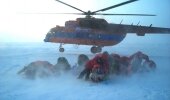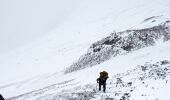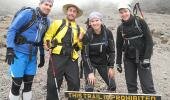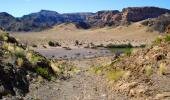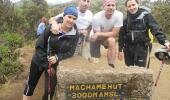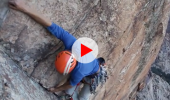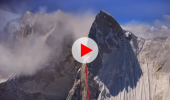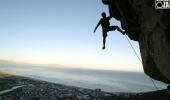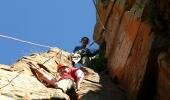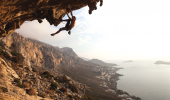Words: Kobus Bresler | Photos: MCSA Saerch and Rescue
“It’s 3:05 PM on Sunday, April 27, 2003. This marks my twenty-four-hour mark of being stuck in Blue John Canyon. My name is Aron Ralston. My parents are Donna and Larry Ralston, of Eaglewood, Colorado. Whoever finds this, please make an attempt to get this to them. Be sure of it. I would appreciate it.”
By now, the story of Aron Ralston has become well-known internationally following the release of his book in 2004 and a Hollywood movie a few years later based on his experience. Aron made the decision to cut off his arm after getting stuck in a canyon by a falling rock. Despite being a frequent user of the outdoors, he still found himself in trouble on an outing alone in the great outdoors. At the time, I am sure he wished he wasn’t alone. Imagine what a difference it would have made if he had at least told someone where he was going and when they could expect him back, so that they could contact rescue services to initiate a search after this time had passed. I bet Aron would have preferred to become famous for some other reason than cutting off one of his own limbs.
As an outdoor enthusiast myself, I am relieved to know that in South Africa our Mountain Club of SA Search and Rescue (MSAR) operations are alive and well, and simply a phone call away. I am even more relieved that I’ve never needed their assistance, but their emergency contact numbers are always in my backpack. Every responsible outdoor user must have the emergency contact details with them at all times! Even more important is to inform someone where you are going and when they can expect you back. A critical aspect that often gets overlooked is your medical history, so be sure to inform your fellow hikers or climbers about any medical issues and allow them access to your medical aid information. There is nothing worse than ending up in a dubious clinic when you can afford a proper private hospital. By doing this, you will ensure that a safety net is in place when you really need it.
The first recorded mountain rescue in South Africa was in 1881 on Table Mountain, but the Mountain Club of South Africa (MCSA) was only founded in 1891. One of the key events that led to its formation was an incident during September 1889, where a party of ladies and gentlemen was caught by the infamous ‘table cloth’ on Table Mountain and forced to spend a bitterly cold night on the mountain. This incident set the ball rolling and in 1891 the MCSA was formed. From the onset, one of its main objectives has been the organising of search and rescue parties to provide assistance to fellow mountaineers and general members of the public. And the first officially recorded MCSA rescue was during 1893, on Table Mountain. To this day, Table Mountain and its surrounds remain the area that is responsible for the most mountain rescue operations in South Africa.
The MCSA is currently one of only two mountain clubs in Africa affiliated to the world mountaineering body, the UIAA. It consists of 14 Sections that are geographically distributed around the country and Namibia.
MSAR has been involved in more than 3,000 rescues since its inception and today responds on a weekly basis to various incidents, with the Western Cape being the most active region. MSAR has come a long way since the early days and over the past hundred years MSAR has continued to develop its skills and training, and possesses a significant amount of specialised technical equipment. It works closely with other state and volunteer emergency agencies, such as the South African Air Force, Wilderness Search and Rescue (Western Cape), Off-Road Rescue Unit, South African Police Service and the Aeronautical Rescue Coordination Centre. It currently comprises six permanent teams in various parts of the country.
The MCSA Search and Rescue teams are run entirely on a volunteer basis and do not charge for rescue services. The volunteers are not paid or compensated for their time, expertise, personal equipment or even direct costs such as fuel. Funding for team equipment comes primarily from the MCSA members and public donations. Unlike Search and Rescue in Europe, for example, helicopters are not indoctrinated into the local MSAR approach yet even though a significant number of rescues require helicopter support. Most rescues still involve driving to the scene and doing the grunt- or search-work manually and on foot. Volunteers forming part of the call-out teams are required to remain fit and active, and they are constantly refreshing their skills. To assist with this, regular training exercises are conducted to keep rescuers fresh and up to date.
The first mountain rescue operation that involved a SAAF helicopter was on 12 October 1957, on Crown Peak near Swellendam. The search was for two missing schoolboys, but unfortunately the boys were not found alive. In July 1963, the MCSA assisted in the recovery of a SAAF pilot who crashed on the Saronsberg. This led to the formalisation of a programme of cooperation after an exchange of letters between the MCSA and SAAF. The first regular and official training between the SAAF and MCSA took place in May 1980 in Cape Town. Today, regular and formalised training is scheduled with SAAF Squadrons from Pretoria, Hoedspruit, Durban, Bloemfontein and Cape Town.
I can continue mentioning facts, dates and specifics, but the bottom line is simple. The Mountain Club of SA Search and Rescue is a well organised and structured team of volunteers. MSAR is always on standby and ready for call out to any destination within South Africa. If you find yourself in serious trouble out in the hills, these are the guys you want to get in touch with. MSAR has often been asked to work outside their original mandate and have assisted with swift water rescue, flood rescue and air crash clean-up and recovery. The teams have also worked outside South African borders assisting with search operations in neighbouring countries during disaster periods. So, before you head out into the great outdoors on your next adventure, ensure that you have their contact numbers with you. It's peace of mind well worth the small effort!
dinFO:
If you would like to get involved by donating to the operational fund or even becoming a volunteer rescuer, get in touch with your regional contact person for more information by visiting http://cen.mcsa.org.za. They will also be able to assist you with any other aspects involving Mountain Search and Rescue. Please refer to www.doitnow.co.za/mountain_rescue for these details.
